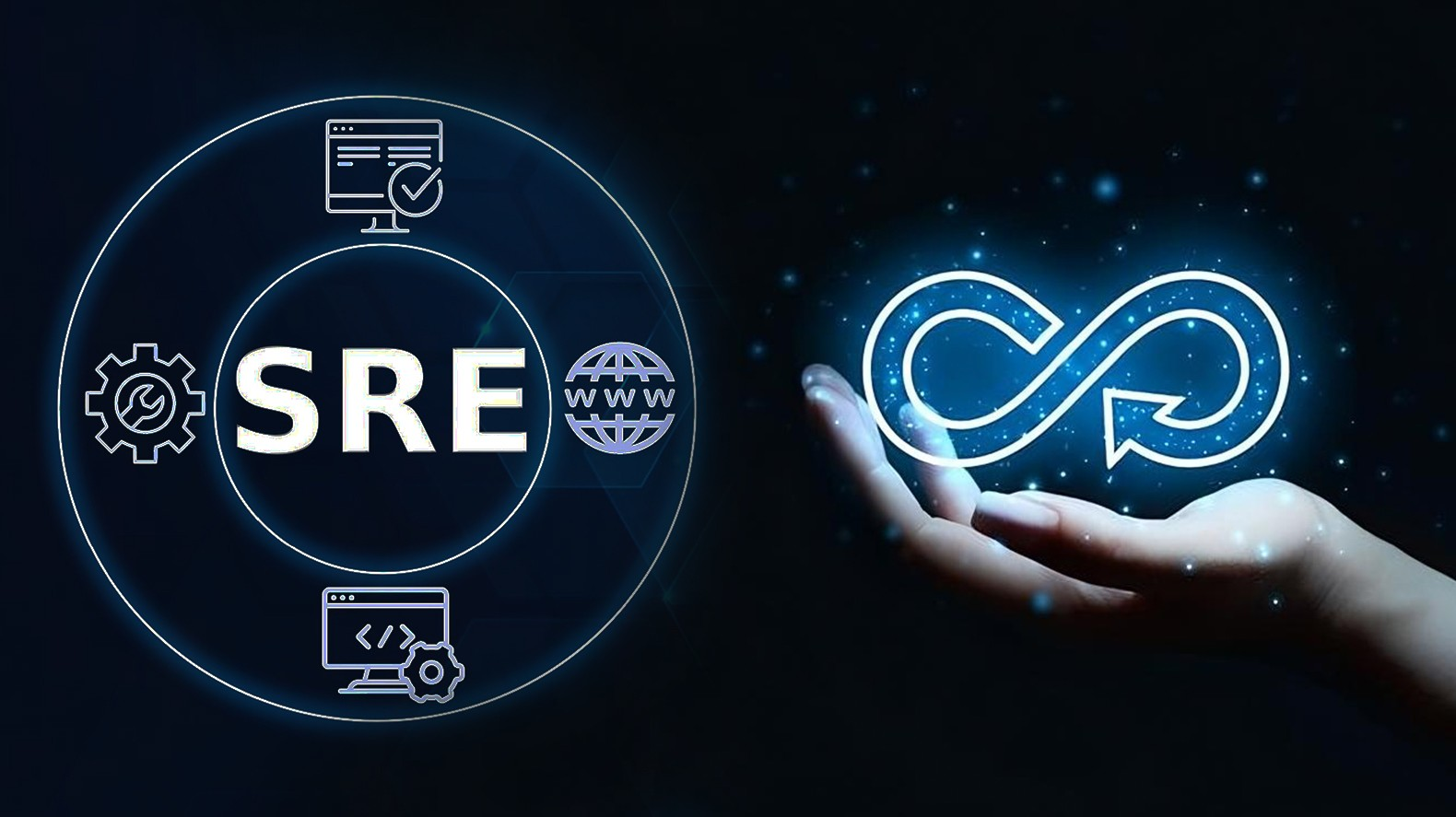SRE and DevOps: Unlocking Your Team's Full Potential

In today's fast-paced digital landscape, organizations are under immense pressure to deliver software products and services with unparalleled speed, reliability, and efficiency. That is why, to meet these demands, many companies are turning to DevOps and Site Reliability Engineering (SRE) to streamline their operations and enhance their overall performance.
Understanding DevOps
The DevOps culture shifts emphasize collaboration between development and operations teams. Additionally, DevOps seeks to expedite software delivery while preserving high quality by dismantling software silos and encouraging shared responsibility for the full software lifecycle. This methodology entails the use of automation technologies, pipelines for continuous integration and delivery (CI/CD), and a major emphasis on feedback loops.
DevOps teams are typically cross-functional and include individuals with diverse skill sets, such as developers, operations engineers, quality assurance (QA) engineers, and infrastructure engineers. Furthermore, together, they increase overall productivity, facilitate better communication, and simplify procedures.
The Role of SRE
Conversely, Site Reliability Engineering (SRE) is an area that integrates software engineering concepts into operations and infrastructure design. SRE teams are responsible for systems' stability, scalability, and performance. They work closely with development teams to build and maintain systems that meet the needs of the business while adhering to engineering principles.
Furthermore, SRE teams often leverage automation and monitoring tools to prevent issues, detect problems early, and rapidly restore service. Additionally, they also play a critical role in capacity planning, incident response, and service level objectives (SLOs).
SRE vs DevOps: Is SRE and DevOps the same?
While DevOps and SRE are closely related, they have distinct focuses. DevOps is a broader cultural shift that encompasses the entire software lifecycle, whereas SRE is specifically concerned with the reliability and performance of systems.
Moreover, DevOps teams are typically cross-functional and include individuals with diverse skill sets, while SRE teams often consist of engineers with a strong software development background. Additionally, DevOps emphasizes collaboration and communication, while SRE places a greater emphasis on engineering practices and automation.
How do SRE and DevOps Work Together?
To achieve optimal results, DevOps and SRE should work together seamlessly. DevOps provides the cultural foundation and collaborative framework, while SRE brings engineering expertise and focus on reliability. By combining their strengths, organizations can create a high-performing system that delivers software rapidly and reliably.
Furthermore, SRE teams can help DevOps teams implement automation and monitoring practices, improve incident response, and establish SLOs. In turn, DevOps teams can provide SRE teams with valuable insights into customer needs and business objectives.
Building a High-Performing SRE and DevOps Team
Creating a successful SRE and DevOps team requires careful planning and execution. Here are some key steps to consider:
Define clear roles and responsibilities: To prevent confusion and overlap, clearly define the roles and responsibilities of the DevOps and SRE teams.
Foster a culture of collaboration: Further, encourage open communication and knowledge sharing between SRE and DevOps teams.
Invest in training and development: Provide opportunities for team members to learn new skills and stay up-to-date with the latest technologies and best practices.
Embrace automation: In order to increase productivity and lower mistake rates, automate as many procedures as you can.
Implement effective monitoring and alerting: Set up alerts to inform teams of any problems and keep a close eye on system performance.
Establish clear service level objectives (SLOs): Establish quantifiable objectives for the dependability and performance of the system as well.
Continuously improve: Last, regularly review and refine processes to identify areas for improvement.
The Cultural Shift
As vital as the technological components of SRE and DevOps are, it's as critical to acknowledge the cultural shift they demand. DevOps, in particular, requires a fundamental shift in organizational mindset. Furthermore, it necessitates dismantling organizational silos, promoting candid communication, and building a feeling of collective ownership.
SRE, on the other hand, introduces a data-driven approach to operations. By treating infrastructure as code and relying on metrics, SRE fosters a culture of experimentation and continuous improvement. As a result, innovation and efficiency are fueled by the strong synergy that results from SRE and DevOps' shared cultural alignment.
The Role of Automation
Both SRE and DevOps rely heavily on automation. By automating repetitive processes, groups may concentrate on more important work, reduce mistakes, and expedite delivery. SRE leverages automation to build self-healing systems and reduce manual intervention. Automation is a tool used by DevOps teams to optimize the software development lifecycle, from code compilation to deployment.
The combination of SRE and DevOps automation creates a robust and efficient system. For instance, SRE automation can detect anomalies and automatically trigger remediation actions, while DevOps automation ensures rapid deployment of fixes.
The Importance of Monitoring and Observability
Effective monitoring and observability are crucial for the success of SRE and DevOps. These features are essential for SRE teams to monitor system health, locate performance bottlenecks, and spot abnormalities. Monitoring provides DevOps teams with information about user behavior and application performance.
By integrating SRE with DevOps monitoring, firms can gain a holistic perspective of their systems. This comprehensive strategy helps teams to address issues proactively, optimize performance, and enhance the user experience.
The Human Element
Despite the emphasis on automation and technology, the human element remains indispensable in SRE and DevOps. While tools and processes are essential, the success of these initiatives ultimately depends on the people involved.
Strong technical backgrounds, outstanding problem-solving abilities, and a collaborative approach are prerequisites for roles in SRE and DevOps. Teams need to be flexible, welcome change, and be open to continuously learning new things.
The SRE Framework
The SRE framework provides a structured approach to building and operating reliable systems. It consists of four key pillars:
Service Level Objectives (SLOs): Define the expected performance and availability of services.
Error Budgets: Allocate a certain percentage of downtime for each service.
Monitoring and Alerting: Continuously monitor system performance and set up alerts to notify teams of potential issues.
Incident Response: Create and implement efficient incident response plans.
Organizations may increase customer happiness, decrease downtime, and improve system dependability by adhering to the SRE framework.
Challenges and Overcoming Them
Implementing SRE and DevOps is not without its challenges. Organizations may encounter resistance to change, skill gaps, and cultural hurdles. They require a strategic approach and strong leadership. As a result, they will overcome these hurdles.
Establishing a solid basis of cooperation and trust is also crucial. Offering sufficient training and development opportunities can facilitate bridging skill gaps. By clearly communicating the benefits of SRE and DevOps, organizations can gain buy-in from stakeholders.
Measuring Success
Enterprises must establish key performance indicators (KPIs) to assess the success of SRE and DevOps programs. Metrics such as mean time to repair (MTTR), deployment frequency, and change failure rate can provide valuable insights.
It's important to remember that success goes beyond metrics. Improved collaboration, increased employee satisfaction, and enhanced customer experience are also critical indicators of success.
SRE and DevOps Case Studies
Let's examine a few real-world examples of businesses that have effectively used SRE and DevOps to illustrate the strength of these methodologies.
Case Study 1: Netflix

Netflix, the streaming giant, is a prime example of an organization that has leveraged SRE and DevOps to achieve remarkable success. Netflix was able to extend its platform to millions of concurrent users by using a microservices design and automating infrastructure management.
SRE plays a crucial role in ensuring the reliability and performance of Netflix's streaming service. By implementing rigorous monitoring and alerting, SRE teams can quickly identify and resolve issues, minimizing service disruptions. DevOps techniques make rapid product development and deployment possible, allowing Netflix to stay one step ahead of the competition.
Case Study 2: Google

As the birthplace of SRE, Google is a pioneer in applying these principles to large-scale systems. Google's infrastructure is built on automation and reliability, enabling the company to deliver innovative products and services at an unprecedented pace.
SRE teams at Google focused on building tools and systems that automate routine tasks, allowing engineers to concentrate on more strategic initiatives. Google has eliminated divisions between development and operations by implementing a DevOps culture, which has improved productivity and sped up time-to-market.
Case Study 3: Amazon

Amazon, another tech giant, has successfully implemented SRE and DevOps to support its e-commerce platform. The company's focus on automation and scalability has enabled it to handle massive traffic spikes during peak shopping seasons.
SRE teams at Amazon play a critical role in ensuring the availability and performance of Amazon's website and services. By leveraging DevOps practices, Amazon can rapidly deploy new features and enhancements, improving the customer experience.
Lessons Learned
These case studies illustrate a number of important takeaways for businesses considering SRE and DevOps implementations:
Start small: Begin with a pilot project to give the team the required experience and help them build momentum.
Focus on culture: Additionally, create a collaborative environment that fosters open communication and shared ownership.
Invest in automation: Further, automate as many processes as possible to improve efficiency and reduce errors.
Measure and iterate: Continuously monitor performance and make adjustments based on data.
Build a skilled team: Finally, invest in training and development to build a team with the necessary skills.
The Future of SRE and DevOps
The rapid pace of technological advancement is reshaping the landscape of software development and IT operations. SRE and DevOps, as foundational pillars of modern IT, are evolving in response to these changes.
AI and Machine Learning Integration
AI and ML trends have enormous potential to increase system stability, make better decisions, and automate jobs.
Predictive analytics: SRE teams may proactively resolve issues before they negatively affect users by using AI to anticipate system failures through the analysis of massive volumes of data.
Intelligent automation: Further, AI-powered automation can streamline repetitive tasks, freeing up SRE and DevOps engineers to focus on higher-value activities.
Anomaly detection: Moreover, machine learning algorithms can identify unusual patterns in system behavior, helping SRE teams pinpoint the root causes of problems more efficiently.
Cloud Native and Kubernetes Dominance
Moreover, cloud-native architectures and Kubernetes are becoming the de facto standards for modern application development and deployment. SRE and DevOps teams will need to adapt to this shift by acquiring expertise in containerization, orchestration, and cloud-native technologies.
Infrastructure as code: SRE teams will leverage infrastructure as code principles to manage cloud-native environments effectively.
Kubernetes mastery: A deep understanding of Kubernetes will be essential for both SRE and DevOps engineers.
Cloud security: SRE teams will be essential in guaranteeing the security and compliance of cloud-native apps as more businesses move to the cloud.
DevSecOps and Security by Design
Security is no longer an afterthought; it's an integral part of the software development lifecycle. DevSecOps, a combination of DevOps and security, is gaining traction. SRE teams will need to work closely with security teams to build security into systems from the ground up.
Shift-left security: It is important to incorporate security testing at an early stage of the development process.
Threat modeling: SRE teams will need to identify potential threats and vulnerabilities to mitigate risks effectively.
Compliance and regulations: Adherence to industry regulations (e.g., GDPR, HIPAA) will be a top priority for SRE and DevOps teams.
Platform Engineering
Additionally, platform engineering is emerging as a new discipline that focuses on building and operating internal developer platforms. SRE and DevOps teams will play a pivotal role in creating these platforms, which will streamline application development and deployment.
Self-service platforms: Empowering developers with self-service capabilities will be a key goal of platform engineering.
Accelerated development: Platform engineering will help organizations achieve faster time-to-market.
Improved developer experience: By providing a robust platform, organizations can enhance developer productivity and satisfaction.
The Rise of Observability
Observability is becoming increasingly important for understanding system behavior and troubleshooting issues. SRE teams will need to invest in tools and practices that enable comprehensive monitoring and analysis.
Distributed tracing: Understanding the flow of requests across complex systems will be crucial.
Log analysis: Effective log management is essential for identifying and resolving issues.
Metrics collection: Gathering relevant performance metrics will help SRE teams optimize system performance.
Conclusion
SRE and DevOps signify a fundamental change in the way that businesses function; they are more than simply catchphrases. By using these strategies, businesses may increase their overall performance, agility, and dependability.
Fusing the strengths of SRE with DevOps can help organizations develop a culture of creativity, efficiency, and customer attention. Although there may be difficulties along the way to SRE and DevOps maturity, there will be big benefits.
By partnering with us for SRE and DevOps, you can unlock the full potential of your team and drive business success.
